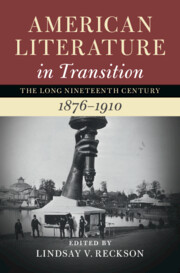Book contents
- American Literature in Transition, 1876–1910
- Nineteenth-Century American Literature in Transition
- American Literature in Transition, 1876–1910
- Copyright page
- Contents
- Contributors
- Series Preface
- Acknowledgments
- Chronology
- Introduction
- Part I Transitive States
- Part II Post-Reconstruction Aesthetics
- Part III Old Materialisms
- Chapter 11 Oil
- Chapter 12 Waste
- Chapter 13 Blood
- Chapter 14 Color
- Part IV Immanent Techniques
- Index
Chapter 12 - Waste
from Part III - Old Materialisms
Published online by Cambridge University Press: 24 August 2022
- American Literature in Transition, 1876–1910
- Nineteenth-Century American Literature in Transition
- American Literature in Transition, 1876–1910
- Copyright page
- Contents
- Contributors
- Series Preface
- Acknowledgments
- Chronology
- Introduction
- Part I Transitive States
- Part II Post-Reconstruction Aesthetics
- Part III Old Materialisms
- Chapter 11 Oil
- Chapter 12 Waste
- Chapter 13 Blood
- Chapter 14 Color
- Part IV Immanent Techniques
- Index
Summary
Waste is a slippery word: noun and verb; object and process. It can reference the material objects of garbage and trash, decimated or ruined places, or worn and suffering bodies. As Jennifer Wenzel writes, “waste hews toward its concrete sense as discard: material byproducts of some transformative process, metabolic or mechanical; things past the end of their wonted, wanted life. Quite literally, waste isn’t what it used to be.”1 But waste is also linked to a kind of prodigality and excess that has less to do with scarcity than with surplus. In this sense, people can waste time and money, opportunities and chances. People can be wastrels, excessive and unproductive, squandering the time and potential that are spectral objects exchangeable for money. The category of waste – its implication in the mechanization of laboring bodies, the creation of the infrastructural systems of industrial capital, the administration of various places and populations, the usefulness and charm of various objects – is the fuel for and result of an accelerating industrial system. As such, waste is a particularly acute index of the late nineteenth century’s complex system of values.
- Type
- Chapter
- Information
- American Literature in Transition, 1876–1910 , pp. 231 - 244Publisher: Cambridge University PressPrint publication year: 2022



